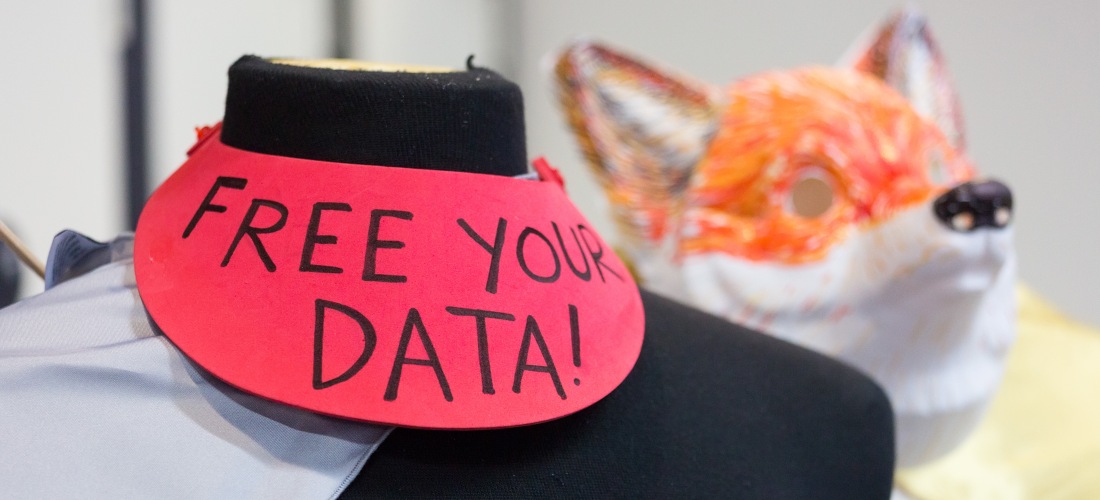Cross-posted on the Mozilla Science blog. Image courtesy of Mozilla Festival, under CC-BY 2.0.
We’ve had a hell of a great year at the Mozilla Science Lab. Thank you. And now, I’m excited to announce some new job titles and what’s next for our team. But first, a quick look back.
In the past year, the Science Lab has kind of been in startup mode – we brought on three new staff members and welcomed four Mozilla Fellows, ran a number of in-person workshops and meetings to refine our learning strategy, shipped two new sets of curriculum, and brought hundreds of people together around the world through sprints and the Mozilla Festival. In that time, we’ve learned a lot about what it means to meaningfully and thoughtfully work alongside members of the research community to further open practice, and how to build and sustain momentum. We’ve also sharpened our focus as an organization, building on what Mozilla does best: connecting communities through open curricula, global campaigns, training, policy, and events around issues like access to information, privacy, and digital inclusion.
The Science Lab is one of a number of programs at Mozilla that work to enable, empower and activate communities consisting of developers, educators, advocates and more. We do this primarily through fellowships, mentorship and project-based learning (through sprints and open source projects, specifically). Other programs include ones focusing on learning and education, advocacy, the internet of things, and women and web literacy. They make up what we’re referring to as the Mozilla Leadership Network, and represent a new way of working at Mozilla: in thinking of our communities as part of something more – a network rather than individual groups on their own. Across those programs, there are a number of shared challenges, from closed paradigms and lack of access to knowledge to privacy and lack of training. These are not solely science specific, but work we all carry in various ways to meet the needs of our communities. There are also shared sources of inspiration for our work, from civic tech and open government models to the open source movement and OER.
Here’s how we’re making our commitment to the Mozilla Network and our work with communities even stronger.
First, we’ll continue to invest in the network of open science leaders through the fellowships, study groups, Working Open workshops and mentorship. We’re also working on a mini-grant scheme (more this fall!) to further invest in our mission, and help catalyze prototyping efforts and support local organizers and mentors.
Second, the program leads for the Science Lab, Learning programs, Open Internet of Things, Women and Web Literacy and Advocacy Network will operate as one unified team, rather than operate in isolation.
Thirdly, we’re restructuring programs: for the Science Lab, Stephanie Wright, Zannah Marsh and Aurelia Moser, will be leading our work to make research open and accessible through fellowships, mentorship, and learning through open source projects and prototyping. Stephanie Wright, our Open Data Training Lead, is taking over leadership of the Science Lab, and our Fellows (current and alumni), Study Group leads, and mentors will take a more active role in supporting the community, helping us run workshops and provide expertise on what it means to work openly.
Abby Cabunoc Mayes, the Science Lab’s lead developer, is graduating into a new role leading developer engagement and contributorship (much like she’s done for sprints, Collaborate and “working open” in science) for the Mozilla Leadership Network. Arliss Collins is now serving as the Data and Metrics Analyst for the network, building off her data-driven approach to understanding community engagement across learning and project-based initiatives for the Science Lab for other programs, as well. Both Abby and Arliss’ roles still involve supporting the Science Lab’s work, while modelling that work for the broader organization – a huge step forward.
My role is also evolving. I will now oversee the four programs of the Mozilla Leadership Network (science, learning, women and web literacy and internet of things) while working closely with the advocacy network to ensure that we can work together to make transformative change globally. It’s been an honor to be the first director of the Science Lab. Now, we will take what we’ve learned this year in science and apply that knowledge across programs, as each program lead has an even bigger year next year.
We want to thank you for carrying this work forward and helping us grow the community of open science leaders (over 60 trainers and mentors worldwide this past year alone!). We can’t wait to continue supporting the open research community and working alongside you all to continue to further openness on the web. We hope you’ll join us.
